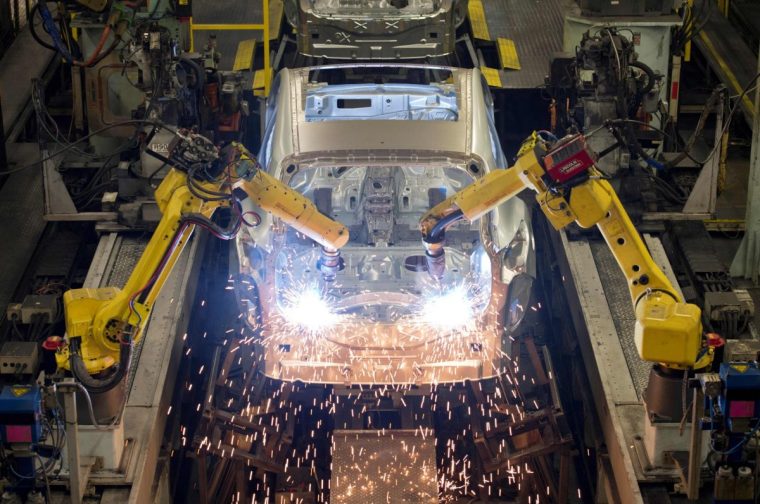Ministers are resisting pleas from carmakers who say zero-emission rules should be relaxed or the future of the UK car industry will be at risk.
Vehicle makers and electric vehicle (EV) charging firms warned the UK motor industry is set to miss the mandatory government targets for EV sales in its first year after a slowdown in consumer demand.
Addressing Business Secretary Jonathan Reynolds and Louis Haigh, the Transport Secretary, they warned urgent action is needed to address the fines system for breaching the targets.
Companies face financial penalties of up to £15,000 a car for missing the targets. Bosses warns this could divert vital investment away from new vehicles and technology in the UK.
Nissan told the Government that failure to change it EV targets could result in “a potentially irreversible impact on the UK automotive sector”.
The Japanese firm was one of a number of carmakers that took part in an industry-wide meeting with Cabinet members and other officials on the transition to EVs.
As the meeting took place, Ford announced it was shedding up to 4,000 more jobs, including hundreds in the UK, as it struggles with slowing demand for electric vehicles and fierce competition with Chinese rivals.
Nissan said that despite discounting to drive up business this year, the Society of Motor Manufacturers and Traders (SMMT) predicts EV sales will only reach 18.5 per cent of the total market.
The 2024 target under the Zero Emission Vehicle (ZEV) Mandate is 22 per cent, and this will rise to 28 per cent next year.
“Missing the target will result in significant fines for manufacturers unless credits are purchased from EV-only brands – none of which manufacture in the UK, meaning the UK automotive industry will effectively be subsidising EV sectors in other countries, at the expense of investment in Britain,” the company warned.
Nissan, which is investing heavily in electric vehicles at its plant near Sunderland, called for more flexibility and a two-year “monitoring period” that would protect the industry from “potentially devastating” fines for missing EV targets.
Guillaume Cartier, Nissan’s Europe boss, said the company had consistently supported the aims of the UK’s ZEV Mandate and have been working towards a fully electric future since the first Nissan LEAF model arrived in 2010.
The Japanese carmaker said it was proud to call the UK home, employing more than 7,000 people who design, engineer and build vehicles in Britain for customers across Europe and the world, contributing more than £2bn per year to the UK economy though wages, UK-built parts and services.
But Mr Cartier warned: “The mandate risks undermining the business case for manufacturing cars in the UK, and the viability of thousands of jobs and billions of pounds in investment. We now need to see urgent action from the Government by the end of the year to avoid a potentially irreversible impact on the UK automotive sector.”
Ministers were told that Nissan was the biggest UK carmaker through its Sunderland plant and its international design and research and development centres in London and Bedfordshire. Three new EVs models have already been announced for UK production.
Further investments in battery recycling, skills training and and vehicle-to-grid technology are also in progress to help realise “a sustainable, fully-electric future.”

Mike Hawes, chief executive of the SMMT, said: “A strong market and manufacturing base that sustains jobs and drives growth requires workable regulation backed by support for consumers – fiscal incentives and confidence that the charging network will be there when it is needed.
“We will now work urgently with government to identify any adjustments necessary to help the industry and government meet their targets, instilling confidence in the consumer and other stakeholders, all of whom are part of this transition.”
Manufacturers have been set these targets for sales of zero-emission vehivles (ZEVs). They face fines for every non-compliant vehicle sold.
- 22 per cent sales share of ZEVs in 2024
- 28 per cent in 2025
- 33 per cent in 2026
- 38 per cent in 2027
- 52 per cent in 2028
- 66 per cent in 2029
- 80 per cent in 2030
A Government spokesman said: “Recognising the global challenges the industry has been facing, ministers underlined the Government’s commitment to working constructively and in close partnership with the sector as we support the transition to electric vehicles by 2030.
“The UK automotive sector now has the fastest growth of zero emission vehicles of any major European market, and we’re providing more than £2.3bn to support industry and consumers in making the switch, with 57 new public electric vehicle chargers added on average each day.”

'President Musk' is flexing his muscles and revealing how weak Trump is